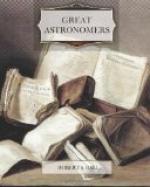It is interesting for us to note that at one time there was a proposal that Kepler should forsake his native country and adopt England as a home. It arose in this wise. The great man was distressed throughout the greater part of his life by pecuniary anxieties. Finding him in a strait of this description, the English ambassador in Venice, Sir Henry Wotton, in the year 1620, besought Kepler to come over to England, where he assured him that he would obtain a favourable reception, and where, he was able to add, Kepler’s great scientific work was already highly esteemed. But his efforts were unavailing; Kepler would not leave his own country. He was then forty-nine years of age, and doubtless a home in a foreign land, where people spoke a strange tongue, had not sufficient attraction for him, even when accompanied with the substantial inducements which the ambassador was able to offer. Had Kepler accepted this invitation, he would, in transferring his home to England, have anticipated the similar change which took place in the career of another great astronomer two centuries later. It will be remembered that Herschel, in his younger days, did transfer himself to England, and thus gave to England the imperishable fame of association with his triumphs.
The publication of the Rudolphine tables of the celestial movements entailed much expense. A considerable part of this was defrayed by the Government at Venice but the balance occasioned no little trouble and anxiety to Kepler. No doubt the authorities of those days were even less Willing to spend money on scientific matters than are the Governments of more recent times. For several years the imperial Treasury was importuned to relieve him from his anxieties. The effects of so much worry, and of the long journeys which were involved, at last broke down Kepler’s health completely. As we have already mentioned, he had never been strong from infancy, and he finally succumbed to a fever in November, 1630, at the age of fifty-nine. He was interred at St. Peter’s Church at Ratisbon.
Though Kepler had not those personal characteristics which have made his great predecessor, Tycho Brahe, such a romantic figure, yet a picturesque element in Kepler’s character is not wanting. It was, however, of an intellectual kind. His imagination, as well as his reasoning faculties, always worked together. He was incessantly prompted by the most extraordinary speculations. The great majority of them were in a high degree wild and chimerical, but every now and then one of his fancies struck right to the heart of nature, and an immortal truth was brought to light.




